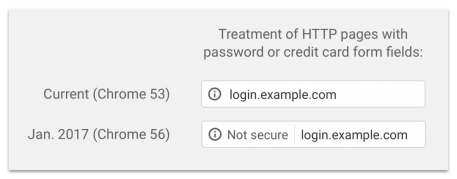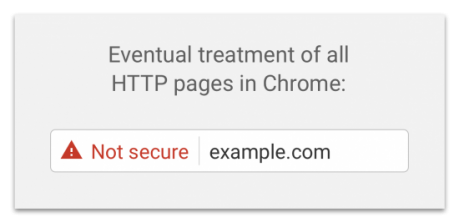As predicted, Google has launched their latest update of informing website visitors when they are not on a secure website. This means your site could be turning folks away faster than a bouncer at a NYC nightclub.
We live in a world where cases of data breaches and internet spying are on the rise. Hackers are at an all-time high and they are having a field-day while government spy agencies are hungrier than ever to access internet users’ information. A few years back, most website owners were comfortable with a HTTP protocol because there were fewer threats to data security.
As a matter of fact, only sites which required utmost user privacy such as banks had switched to HTTPS. Flash forward to now and almost every website you visit has a padlock followed by the five letters-HTTPS on the browser`s address bar. In simple terms, HTTP is an outdated protocol that no reputable website should be using. If you have been keen on the latest internet trends, you should have noticed that HTTP is slowly being phased out as search engines continue with efforts of making the internet safe for all users.
Why the urgent need to switch to a HTTPS protocol?
The major difference between HTTP and HTTPS is just the S at the end which stands for secure. It means that all forms of communication between your browser and the website you are visiting are encrypted. With a HTTPS protocol, data transfers between your browser and a website cannot be intercepted. No one outside the connection will be able to read or interpret the communication between the user`s browser and your website.
HTTPS secured sites usually have an SSL certificate from a recognized certificate authority. The easiest way to recognize a website which has an SSL certificate is the presence of a small padlock on the top-left side of the browser`s address bar. Any website that has not upgraded to HTTPS is no longer considered safe for internet users.
The benefits of using HTTPS:
- Data security and confidentiality - information shared by anyone who visits your website will be safe and secure and cannot be intercepted by any middleman.
- No data corruption - data is first encrypted before it is transferred which therefore means that no outside forces can access it and use it maliciously. For instance if someone hacked into the user`s WIFI they will still not be able to access the information that is being transferred.
- Websites that are not SSL certified are prone to malicious people who may intercept the connection and re-direct users to a site that they didn`t intend to visit. Once that happens, user’s privacy will be compromised and anything that they share on that site may be used against them.
- HTTPS boosts your rankings on search engines - Google will always rank HTTPS URLs higher than HTTP URLs because it wants to encourage more website owners to acquire an SSL certificate in order to safeguard all users. You will rarely find a site that uses a HTTP protocol on the first page of Google`s search results. HTTPS should thus be on the list of everyone`s search engine optimization strategies.
- Avoid the very embarrassing label of `not secure` when people visit your website - The label is meant to alert users that the website they intend to visit is not secure and their safety cannot be guaranteed. Very few internet users in this day and age would be willing to continue using a website once they learn that may be prone to a data security breach.
- Sites that use HTTPS protocol are fast and highly responsive - This provides a better user experience especially for people who are accessing your website via mobile devices.
In a nutshell, it is imperative that all web owners upgrade to a HTTPS protocol if at all they care about their visitors’ safety and security. Switch to HTTPS now and be part of a global plan to make the internet a safe place for all. Contact us today to learn about making the switch to secure.



